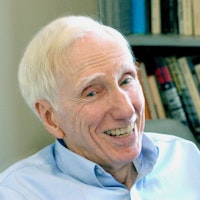A world civil religion could be accepted as a fulfillment and not as a denial of American civil religion. Indeed such an outcome has been the eschatological hope of American civil religion from the beginning. To deny such an outcome would be to deny the meaning of America itself.
Robert N. Bellah

A World Civil Religion
Topic: Society & Civil Religion
“Out of the first and second times of trial have come, as we have seen, the major symbols of the American civil religion. There seems little doubt that a successful negotiation of this third time of trial–the attainment of some kind of viable and coherent world order–would precipitate a major new set of symbolic forms. So far the flickering flame of the United Nations burns too low to be the focus of a cult, but the emergence of a genuine transnational sovereignty would certainly change this. It would necessitate the incorporation of vital international symbolism into our civil religion, or, perhaps a better way of putting it, it would result in American civil religion becoming simply one part of a new civil religion of the world. It is useless to speculate on the form such a civil religion might take, though it obviously would draw on religious traditions beyond the sphere of biblical religion alone. Fortunately, since the American civil religion is not the worship of the American nation but an understanding of the American experience in the light of ultimate and universal reality, the reorganization entailed by such a new situation need not disrupt the American civil religion’s continuity. A world civil religion could be accepted as a fulfillment and not as a denial of American civil religion. Indeed, such an outcome has been the eschatological hope of American civil religion from the beginning. To deny such an outcome would be to deny the meaning of America itself.“
Robert Neelly Bellah (February 23, 1927 – July 30, 2013) was an American sociologist, and the Elliott Professor of Sociology at the University of California, Berkeley. He was internationally known for his work related to the sociology of religion.
Bellah received a BA in social anthropology from Harvard College in 1950. His undergraduate honors thesis was titled “Apache Kinship Systems,” and won the Phi Beta Kappa Prize. It was later published in 1952.
He graduated from Harvard in a joint sociology and Far East languages program, with Talcott Parsons and John Pelzel as his advisors, respectively.[2] Bellah first encountered the work of Talcott Parsons as an undergraduate when his senior honors thesis advisor was David Aberle, a former student of Parsons. Parsons was specially interested in Bellah's concept of religious evolution and the concept of "Civil Religion." They remained intellectual friends until Parsons' death in 1979. He received his PhD in 1955. His doctoral dissertation was titled Tokugawa Religion and was an extension of Weber’s Protestant ethic thesis to Japan. It was published in 1957.
Civil Religion in America
Bellah, Robert N. Beyond Belief: Essays on Religion in a Post-Traditional World. University of California Press, 1991, p. 168.

Robert N. Bellah
Theme: A Vision of America
Resources
Copyright © 2017 – 2024 LuminaryQuotes.com About Us

American Civil Religion—A Response to Critics
At the beginning of a reprint of this essay, Robert Bellah wrote:
“This chapter was written for a Dædalus conference on American Religion in May 1966. It was reprinted with comments and a rejoinder in The Religious Situation: 1968, where I defend myself against the accusation of supporting an idolatrous worship of the American nation. I think it should be clear from the text that I conceive of the central tradition of the American civil religion not as a form of national self-worship but as the subordination of the nation to ethical principles that transcend it in terms of which it should be judged. I am convinced that every nation and every people come to some form or religious self-understanding whether the critics like it or not. Rather than simply denounce what seems in any case inevitable, it seems more responsible to seek within the civil religious tradition for those critical principles which undercut the ever-present danger of national self-idolization….”
— Robert N. Bellah [Beyond Belief: Essays on Religion in a Post-Traditional World].
An Almost Chosen People
“While some have argued that Christianity is the national faith, and others that church and synagogue celebrate only the generalized religion of “the American Way of Life,” few have realized that there actually exists alongside of and rather clearly differentiated from the churches an elaborate and well-institutionalized civil religion in America. This article argues not only that there is such a thing, but also that this religion-or perhaps better, this religious dimension-has its own seriousness and integrity and requires the same care in understanding that any other religion does.
Behind the civil religion at every point lie biblical archetypes: Exodus, Chosen People, Promised Land, New Jerusalem, and Sacrificial Death and Rebirth. But it is also genuinely American and genuinely new. It has its own prophets and its own martyrs, its own sacred events and sacred places, its own solemn rituals and symbols. It is concerned that America be a society as perfectly in accord with the will of God as men can make it, and a light to all nations.
It has often been used and is being used today as a cloak for petty interests and ugly passions. It is in need-as any living faith-of continual reformation, of being measured by universal standards. But it is not evident that it is incapable of growth and new insight.
It does not make any decisions for us. It does not remove us from moral ambiguity, from being, in Lincoln’s fine phrase, an “almost chosen people.” But it is a heritage of moral and religious experience from which we still have much to learn as we formulate the decisions that lie ahead.”
— Robert N. Bellah [Beyond Belief: Essays on Religion in a Post-Traditionalist World. Berkeley: University of California Press, 1991] p. 168.
Recover the Integrity of Our Faith
“If we truly listen to the Beatitudes, we will hear them as a call for us to recover the integrity of our own faith and its lived expression. But if we only go through the motions of our religion, while closing ourselves off from its real meaning, if we do not discover that the kingdom of heaven is our only true home, the place that defines our most essential identity, we will be lost in the wilderness of decayed traditions and vulnerable to the domination of modernity’s suicidal infatuation with power, the exact opposite of the Gospel message. Our greatest contribution to the world is, with God’s grace, to try to be who, as Christians, we are. That will never be easy and will probably bring upon us rejection and even persecution, but it will also make us exceeding glad”
— Robert N. Bellah [The Robert Bellah Reader edited with Steven M. Tipton].
Commentary by Benjamin Pietro Marcus
In 1967, Robert N. Bellah’s seminal essay, Civil Religion in America, created a template for how both the right and the left defined civil religion to cultivate a sense of belonging, particularly in an era of turbulence. During this period of increasing polarization, Bellah’s words are more relevant than ever in helping us navigate American social and political discourse.
What is civil religion? Bellah defined it as “a collection of beliefs, symbols, and rituals,” drawn from American history and “institutionalized in a collectivity” that functions “not as a form of national self-worship but as the subordination of the nation to ethical principles that transcend it in terms of which it should be judged.” In his essay, Bellah pointed out that quasi-prophets like Thomas Jefferson, Abraham Lincoln, and John F. Kennedy articulated values that embody the country’s highest ideals—its national commandments. Now, on the fiftieth anniversary of Bellah’s essay, it is time for Americans to formulate a new definition of civil religion that decenters a belief in [exclusively] American ideals as the basis for civil religion. Building on the work of Jonathan Haidt and others, this new framework reveals how civil religion—for better or worse—is formed through a constant exchange among beliefs, behaviors, and experiences of belonging.
— Benjamin Pietro Marcus [Religious Literacy Specialist, Religious Freedom Center (Newseum Institute)].